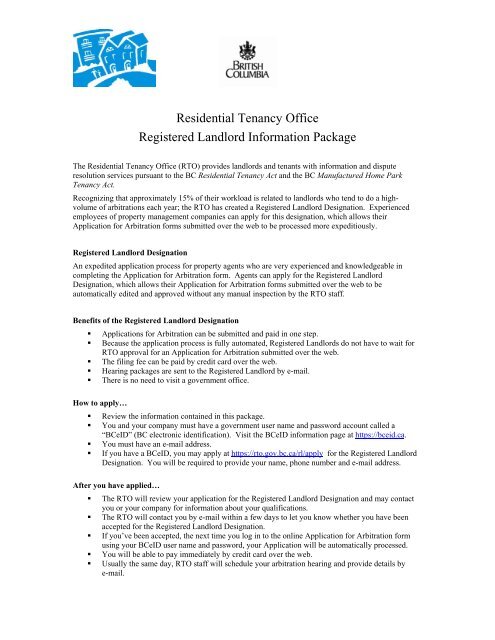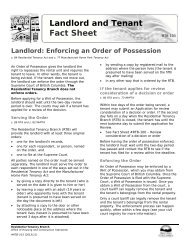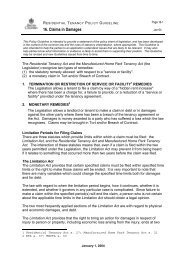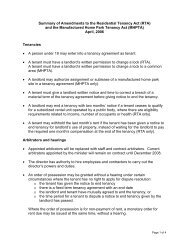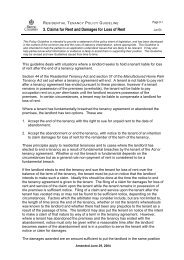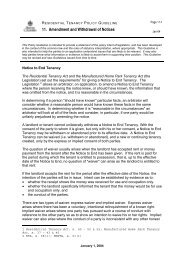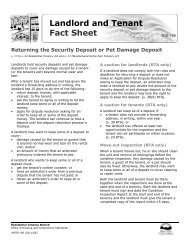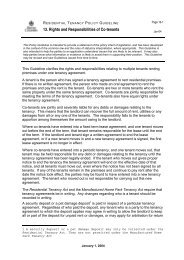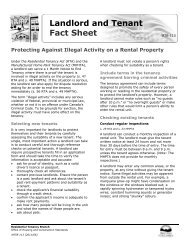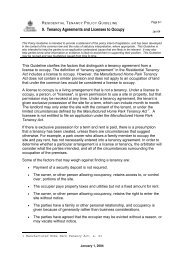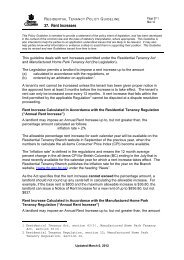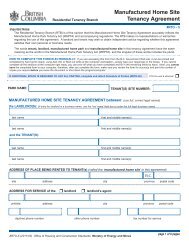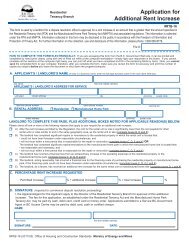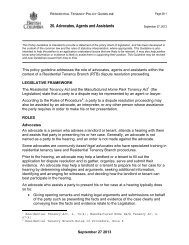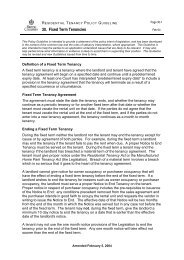Residential Tenancy Office ~ Registered Landlord Information ...
Residential Tenancy Office ~ Registered Landlord Information ...
Residential Tenancy Office ~ Registered Landlord Information ...
You also want an ePaper? Increase the reach of your titles
YUMPU automatically turns print PDFs into web optimized ePapers that Google loves.
<strong>Residential</strong> <strong>Tenancy</strong> <strong>Office</strong><br />
<strong>Registered</strong> <strong>Landlord</strong> <strong>Information</strong> Package<br />
The <strong>Residential</strong> <strong>Tenancy</strong> <strong>Office</strong> (RTO) provides landlords and tenants with information and dispute<br />
resolution services pursuant to the BC <strong>Residential</strong> <strong>Tenancy</strong> Act and the BC Manufactured Home Park<br />
<strong>Tenancy</strong> Act.<br />
Recognizing that approximately 15% of their workload is related to landlords who tend to do a highvolume<br />
of arbitrations each year; the RTO has created a <strong>Registered</strong> <strong>Landlord</strong> Designation. Experienced<br />
employees of property management companies can apply for this designation, which allows their<br />
Application for Arbitration forms submitted over the web to be processed more expeditiously.<br />
<strong>Registered</strong> <strong>Landlord</strong> Designation<br />
An expedited application process for property agents who are very experienced and knowledgeable in<br />
completing the Application for Arbitration form. Agents can apply for the <strong>Registered</strong> <strong>Landlord</strong><br />
Designation, which allows their Application for Arbitration forms submitted over the web to be<br />
automatically edited and approved without any manual inspection by the RTO staff.<br />
Benefits of the <strong>Registered</strong> <strong>Landlord</strong> Designation<br />
• Applications for Arbitration can be submitted and paid in one step.<br />
• Because the application process is fully automated, <strong>Registered</strong> <strong>Landlord</strong>s do not have to wait for<br />
RTO approval for an Application for Arbitration submitted over the web.<br />
• The filing fee can be paid by credit card over the web.<br />
• Hearing packages are sent to the <strong>Registered</strong> <strong>Landlord</strong> by e-mail.<br />
• There is no need to visit a government office.<br />
How to apply…<br />
• Review the information contained in this package.<br />
• You and your company must have a government user name and password account called a<br />
“BCeID” (BC electronic identification). Visit the BCeID information page at https://bceid.ca.<br />
• You must have an e-mail address.<br />
• If you have a BCeID, you may apply at https://rto.gov.bc.ca/rl/apply for the <strong>Registered</strong> <strong>Landlord</strong><br />
Designation. You will be required to provide your name, phone number and e-mail address.<br />
After you have applied…<br />
• The RTO will review your application for the <strong>Registered</strong> <strong>Landlord</strong> Designation and may contact<br />
you or your company for information about your qualifications.<br />
• The RTO will contact you by e-mail within a few days to let you know whether you have been<br />
accepted for the <strong>Registered</strong> <strong>Landlord</strong> Designation.<br />
• If you’ve been accepted, the next time you log in to the online Application for Arbitration form<br />
using your BCeID user name and password, your Application will be automatically processed.<br />
• You will be able to pay immediately by credit card over the web.<br />
• Usually the same day, RTO staff will schedule your arbitration hearing and provide details by<br />
e-mail.
REGISTERED LANDLORD CHECKLIST<br />
1. Register for a BCeID<br />
Visit the BCeID information page at https://bceid.ca<br />
Follow their simple and easy-to-use registration process<br />
2. Apply to become a <strong>Registered</strong> <strong>Landlord</strong><br />
Apply to the RTO for the <strong>Registered</strong> <strong>Landlord</strong> Designation at https://rto.gov.bc.ca/rl/apply<br />
Follow the simple and easy-to-use registration process by providing your name, phone number and e-mail<br />
address. You will receive approval for the <strong>Registered</strong> <strong>Landlord</strong> Designation from the RTO within a few<br />
days.<br />
2
3. Access the e-service<br />
Visit the RTO Web site at www.rto.gov.bc.ca<br />
Click on Application for Arbitration<br />
3
4. Filling out a new application<br />
Click on New Application<br />
Then log in using your BCeID user name and password.<br />
4
5. Complete the application for arbitration in four easy steps<br />
Step 1. Enter applicant information<br />
• Type<br />
• Name<br />
• Contact information<br />
• Additional information<br />
Step 2. Enter respondent information<br />
• Type<br />
• Name<br />
• Contact information<br />
5
Step 3. Enter dispute information<br />
• Type<br />
• Address<br />
• Dispute details<br />
• Dispute code: Entering the dispute code is one of the most difficult sections of<br />
the application process. Attached to the end of this document is a complete list<br />
and description of all the available landlord codes. Please note that it is very<br />
important to get this information correct. Incorrect applications may be rejected<br />
by the arbitrator, which could result in the application being dismissed.<br />
• Specifics of dispute<br />
• Amount claimed<br />
6
Step 4. Review information and submit application<br />
• Near the end of this step you will be required to make certain certifications about the<br />
Application being submitted. Completing this section in full is the online equivalent to<br />
signing your name on the Application.<br />
• After submitting, note your reference number<br />
7
6. Online payment process<br />
Click on My Applications<br />
Click on the $ symbol next to any application whose status is Ready to Pay<br />
Using the secure Web site, enter your credit card information<br />
Click on Pay Now to send your information directly to the bank<br />
• Does not pass through the RTO system<br />
• Is not stored by the RTO system<br />
• Is sent directly to the appropriate bank<br />
8
7. Managing your applications<br />
Click on My Applications to view all open applications. There are three statuses:<br />
• Ready to Pay:<br />
• Saved: Application has not been submitted (i.e. the form is still being completed). Note<br />
that Applications that are not completed within 30 days will be automatically deleted by<br />
the system<br />
• Submitted for Approval/Needs Update/Rejected: Not applicable to <strong>Registered</strong> <strong>Landlord</strong><br />
users as applications are automatically processed.<br />
8. Submitting evidence<br />
All evidence (photographs, receipts, written submissions, etc.) must be provided to the other party. The<br />
evidence you want to use at an arbitration hearing must also be submitted to the <strong>Residential</strong> <strong>Tenancy</strong> <strong>Office</strong><br />
(RTO) as soon as possible after you file your application. The latest possible time for submitting evidence<br />
to RTO is at least two days before the hearing date, not including weekends and holidays. “At least two<br />
days” means the first day (the day you submit the evidence to RTO) and last day (the day of your hearing)<br />
are not included. All Applicants wishing to submit evidence may do so by fax or e-mail. Fax (866) 341-<br />
1269. E-mail RTO-Evidence@TELUS.net<br />
9
9. Scheduling the hearing and the hearing package<br />
The hearing will be scheduled by an RTO staff person and the hearing package will be e-mailed to you.<br />
10. Getting help<br />
Context sensitive help is available any time on any page in the top right hand corner.<br />
11. Exiting the system<br />
Click on Log Off & Close<br />
10
Dispute codes<br />
AN – Amend form of notice<br />
• An order allowing a landlord to correct or amend a defective Notice to End (NTE), or a<br />
determination that adequate notice was given. A landlord who is applying to amend a<br />
defective Notice to End must clearly indicate the error or omission, clearly indicate the<br />
requested change, and identify where on the NTE the incorrect or the missing information<br />
should be located.<br />
ET – Early end of tenancy<br />
• An order for the early end of tenancy and an order of possession for a landlord.<br />
A landlord must understand that in order to be successful in obtaining an early<br />
termination, they must present evidence to convince the Arbitrator that it would not be<br />
fair, safe or equitable for the landlord or other tenants to tolerate whatever the tenant is<br />
doing. A landlord must understand that a delay of any length between the incidents of<br />
behaviour and the filing of an application for an early termination may be detrimental.<br />
LA – Locks and access<br />
• An order permitting or prohibiting the change of locks or other means of access to the<br />
rental unit, residential property, manufactured home park, or common areas of the<br />
residential property or manufactured home park by a landlord or tenant; an order<br />
regarding the change of locks at the beginning of a tenancy; an order setting conditions<br />
regarding or suspending the landlord’s entry into the rental unit or to a manufactured<br />
home site; or an order prohibiting the landlord from restricting access to the residential<br />
property or manufactured home park by the tenant, the tenant’s guests, or a candidate<br />
seeking election to office, or by his or her authorized representative.<br />
Before asking an Arbitrator to order scheduled access, a landlord must have attempted to<br />
exercise their legal right to enter and been refused or denied access.<br />
MN – Monetary<br />
• An order for a landlord or tenant to pay an amount in satisfaction of a claim for debt or<br />
damages against the other in respect of a right or obligation under the RTA or the<br />
MHPTA, the Regulations, or a tenancy agreement. For example, a landlord may apply<br />
for unpaid rent to be awarded; a tenant may apply for the return of a security deposit.<br />
<strong>Landlord</strong>s and tenants must provide full legal names in order to achieve the highest<br />
degree of success. Tenants are best served by naming the legal owner of the rental<br />
property and, failing that, at least the name of the person(s) on the tenancy agreement.<br />
Applicants must list each item in the claim and attach a monetary amount to each item.<br />
OC – Order to comply with agreement or act<br />
• An order that a landlord or tenant comply with the RTA or the MHPTA, the Regulations<br />
or a tenancy agreement, or an order that the RTA/MHPTA applies.<br />
Tenants and landlords in MHP often use this section to determine who is right or wrong<br />
in a disagreement prior to the situation escalating. An application for an order to comply<br />
should not be used if there is a different remedy under the Act or used only to have an<br />
Arbitrator reiterate a section of the legislation.<br />
OP – Order for possession<br />
• An order of possession for a landlord or tenant.<br />
<strong>Landlord</strong>s must understand that if their tenant has disputed a NTE the landlord does not<br />
need to file for an OP; they simply must ask the Arbitrator during the hearing to grant an<br />
OP if the tenant’s application to dispute the NTE fails.<br />
11
PD – Pet deposit<br />
• An order that a landlord may retain the pet deposit, or a portion of the pet deposit plus<br />
interest. This dispute code may only be used by landlords. <strong>Landlord</strong>s must understand<br />
that the pet deposit can be claimed only for damage to the rental property that was caused<br />
by the pet.<br />
RI – Rent increase<br />
• Tenant dispute of an invalid rent increase. <strong>Landlord</strong> application for a rent increase.<br />
A landlord cannot collect a rental increase above the allowable amount. A landlord<br />
applying for a rent increase greater than that calculated in accordance with the<br />
Regulations should read Section 23 of the RTA Regulations and Section 33 of the<br />
MHPTA Regulations. <strong>Landlord</strong>s must use an Application for Additional Rent Increase,<br />
RTO-16.<br />
SD – Security deposit<br />
• An order that a landlord may retain the security deposit, or a portion of the security<br />
deposit plus interest. <strong>Landlord</strong>s must indicate on the application when the tenancy ended<br />
and when the written forwarding address was provided to them by the past tenant.<br />
<strong>Landlord</strong>s must indicate if condition inspections and reports were completed and provide<br />
copies of the condition inspections reports.<br />
SS – Substituted service<br />
• An order for substituted service of any document required to be served under the RTA,<br />
the MHPTA, the Regulations or a tenancy agreement. In most cases, the applicant must<br />
exhaust all possible legal methods of service prior to requesting an order of substituted<br />
service. The applicant must offer alternate methods of service to the Arbitrator and be<br />
able to satisfy the Arbitrator that if the substituted service is allowed, it is reasonable that<br />
the party being served will receive the documents.<br />
12


